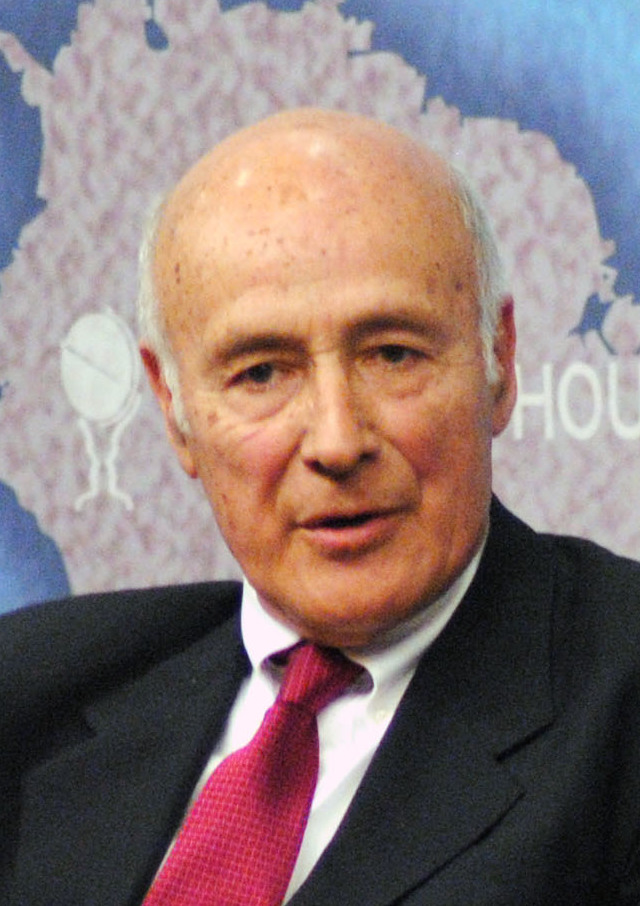Joseph Nye Frases y Citas
Joseph Nye: Frases en inglés
“In foreign policy, as in medicine, leaders must “first do no harm.””
"Obama the Pragmatist" http://www.project-syndicate.org/commentary/joseph-s--nye-defends-obama-s-approach-to-foreign-policy-against-critics-calling-for-a-more-muscular-approach, Project Syndicate (June 10, 2014).
“The new world will not be neat, and you will have to live with that.”
Fuente: Understanding International Conflicts: An Introduction to Theory and History (6th ed., 2006), Chapter 9, A New World Order?, p. 282.
Contexto: The bipolar world is over, but it not going to be replaced by a unipolar world empire that the United States controls alone. The world is already economically multipolar, and there will be a diffusion of power as the information revolution progresses, interdependence increases, and transnational actors become more important. The new world will not be neat, and you will have to live with that.
Fuente: Understanding International Conflicts: An Introduction to Theory and History (6th ed., 2006), Chapter 1, Is There an Enduring Logic of Conflict in World Politics?, p. 2.
Contexto: The world at the beginning of the twenty-first century is a strange cocktail of continuity and change. Some aspects of international politics have not changed since Thucydides. There is a certain logic of hostility, a dilemma about security that goes with interstate politics. Alliances, balance of power, and choices in in policy between war and compromise have remained similar over the millennia.
Fuente: Understanding International Conflicts: An Introduction to Theory and History (6th ed., 2006), Chapter 9, A New World Order?, p. 281.
Fuente: Understanding International Conflicts: An Introduction to Theory and History (6th ed., 2006), Chapter 8, The Information Revolution and the Diffusion of Power, p. 246.
Fuente: Understanding International Conflicts: An Introduction to Theory and History (6th ed., 2006), Chapter 1, Is There an Enduring Logic of Conflict in World Politics?, p. 2.
“Systems can create consequences not intended by any other of their constituent actors.”
Fuente: Understanding International Conflicts: An Introduction to Theory and History (6th ed., 2006), Chapter 2, Origins of the Great Twentieth Century Conflicts, p. 34.
“Cooperation is difficult in the absence of communication.”
Fuente: Understanding International Conflicts: An Introduction to Theory and History (6th ed., 2006), Chapter 1, Is There an Enduring Logic of Conflict in World Politics?, p. 16.
“Any sense of global community is weak.”
Fuente: Understanding International Conflicts: An Introduction to Theory and History (6th ed., 2006), Chapter 1, Is There an Enduring Logic of Conflict in World Politics?, p. 4.
“Power, like love, is easier to experience than to define or measure.”
Fuente: Understanding International Conflicts: An Introduction to Theory and History (6th ed., 2006), Chapter 3, Balance of Power and World War I, p. 60.
“Anarchy means without government, but it does not necessarily mean chaos or total disorder.”
Fuente: Understanding International Conflicts: An Introduction to Theory and History (6th ed., 2006), Chapter 1, Is There an Enduring Logic of Conflict in World Politics?, p. 23.
Fuente: Understanding International Conflicts: An Introduction to Theory and History (6th ed., 2006), Chapter 3, Balance of Power and World War I, p. 61.
“Humans sometimes make surprising choices, and human history is full of uncertainties.”
Fuente: Understanding International Conflicts: An Introduction to Theory and History (6th ed., 2006), Chapter 2, Origins of the Great Twentieth Century Conflicts, p. 51.
“The best hope for the future is to ask what is being determined as well as who determines it.”
Fuente: Understanding International Conflicts: An Introduction to Theory and History (6th ed., 2006), Chapter 6, Intervention, Institutions, and Regional and Ethnic Conflicts, p. 169.
Fuente: Understanding International Conflicts: An Introduction to Theory and History (6th ed., 2006), Chapter 8, The Information Revolution and the Diffusion of Power, p. 252.
Fuente: Understanding International Conflicts: An Introduction to Theory and History (6th ed., 2006), Chapter 9, A New World Order?, p. 265.
Fuente: Understanding International Conflicts: An Introduction to Theory and History (6th ed., 2006), Chapter 7, Globalization and Interdependence, p. 218.
Fuente: Understanding International Conflicts: An Introduction to Theory and History (6th ed., 2006), Chapter 9, A New World Order?, p. 262.
Fuente: Understanding International Conflicts: An Introduction to Theory and History (6th ed., 2006), Chapter 2, Origins of the Great Twentieth Century Conflicts, p. 34.
"Obama the Pragmatist" http://www.project-syndicate.org/commentary/joseph-s--nye-defends-obama-s-approach-to-foreign-policy-against-critics-calling-for-a-more-muscular-approach, Project Syndicate (June 10, 2014).
“At some point, consequences matter.”
Fuente: Understanding International Conflicts: An Introduction to Theory and History (6th ed., 2006), Chapter 1, Is There an Enduring Logic of Conflict in World Politics?, p. 21.
Fuente: Understanding International Conflicts: An Introduction to Theory and History (6th ed., 2006), Chapter 5, The Cold War, p. 125.
“Some say precipitating events are like buses - they come along every ten minutes.”
Fuente: Understanding International Conflicts: An Introduction to Theory and History (6th ed., 2006), Chapter 3, Balance of Power and World War I, p. 77.
“The cure to misunderstanding history is to read more, not less.”
Fuente: Understanding International Conflicts: An Introduction to Theory and History (6th ed., 2006), Chapter 1, Is There an Enduring Logic of Conflict in World Politics?, p. 19.
Fuente: Understanding International Conflicts: An Introduction to Theory and History (6th ed., 2006), Chapter 6, Intervention, Institutions, and Regional and Ethnic Conflicts, p. 187.
“No one can tell the whole story of anything.”
Fuente: Understanding International Conflicts: An Introduction to Theory and History (6th ed., 2006), Chapter 1, Is There an Enduring Logic of Conflict in World Politics?, p. 19.
Fuente: Understanding International Conflicts: An Introduction to Theory and History (6th ed., 2006), Chapter 4, The Failure of Collective Security and World War II, p. 111.
